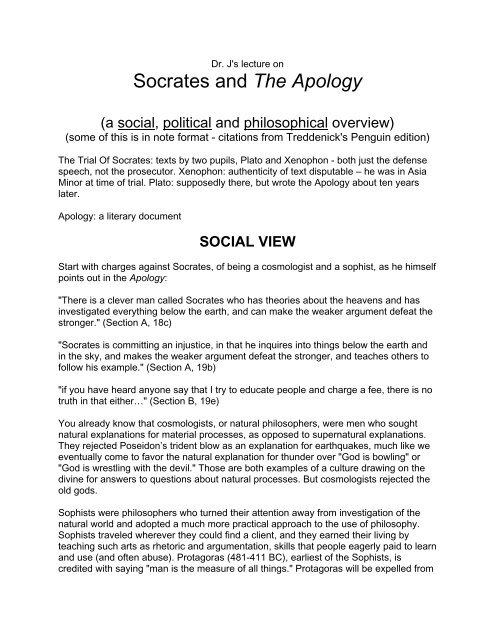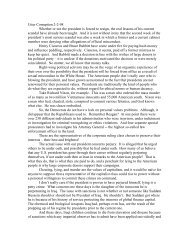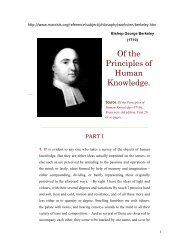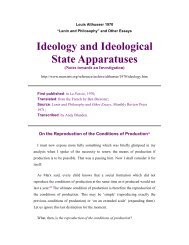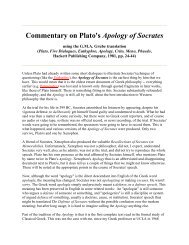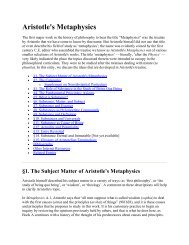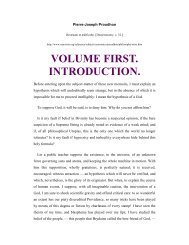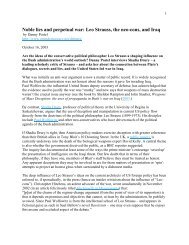Socrates and The Apology - Richard Curtis
Socrates and The Apology - Richard Curtis
Socrates and The Apology - Richard Curtis
Create successful ePaper yourself
Turn your PDF publications into a flip-book with our unique Google optimized e-Paper software.
Dr. J's lecture on<br />
<strong>Socrates</strong> <strong>and</strong> <strong>The</strong> <strong>Apology</strong><br />
(a social, political <strong>and</strong> philosophical overview)<br />
(some of this is in note format - citations from Treddenick's Penguin edition)<br />
<strong>The</strong> Trial Of <strong>Socrates</strong>: texts by two pupils, Plato <strong>and</strong> Xenophon - both just the defense<br />
speech, not the prosecutor. Xenophon: authenticity of text disputable – he was in Asia<br />
Minor at time of trial. Plato: supposedly there, but wrote the <strong>Apology</strong> about ten years<br />
later.<br />
<strong>Apology</strong>: a literary document<br />
SOCIAL VIEW<br />
Start with charges against <strong>Socrates</strong>, of being a cosmologist <strong>and</strong> a sophist, as he himself<br />
points out in the <strong>Apology</strong>:<br />
"<strong>The</strong>re is a clever man called <strong>Socrates</strong> who has theories about the heavens <strong>and</strong> has<br />
investigated everything below the earth, <strong>and</strong> can make the weaker argument defeat the<br />
stronger." (Section A, 18c)<br />
"<strong>Socrates</strong> is committing an injustice, in that he inquires into things below the earth <strong>and</strong><br />
in the sky, <strong>and</strong> makes the weaker argument defeat the stronger, <strong>and</strong> teaches others to<br />
follow his example." (Section A, 19b)<br />
"if you have heard anyone say that I try to educate people <strong>and</strong> charge a fee, there is no<br />
truth in that either…" (Section B, 19e)<br />
You already know that cosmologists, or natural philosophers, were men who sought<br />
natural explanations for material processes, as opposed to supernatural explanations.<br />
<strong>The</strong>y rejected Poseidon’s trident blow as an explanation for earthquakes, much like we<br />
eventually come to favor the natural explanation for thunder over "God is bowling" or<br />
"God is wrestling with the devil." Those are both examples of a culture drawing on the<br />
divine for answers to questions about natural processes. But cosmologists rejected the<br />
old gods.<br />
Sophists were philosophers who turned their attention away from investigation of the<br />
natural world <strong>and</strong> adopted a much more practical approach to the use of philosophy.<br />
Sophists traveled wherever they could find a client, <strong>and</strong> they earned their living by<br />
teaching such arts as rhetoric <strong>and</strong> argumentation, skills that people eagerly paid to learn<br />
<strong>and</strong> use (<strong>and</strong> often abuse). Protagoras (481-411 BC), earliest of the Sophists, is<br />
credited with saying "man is the measure of all things." Protagoras will be expelled from
Athens in 415 BC. Sophists pointed out that while physis (nature) is controlled by an<br />
unchanging set of laws that remain the same wherever you go, nomos (custom, or manmade<br />
law) is arbitrary <strong>and</strong> changes from state to state. This empowered men to think<br />
that they could shape the world <strong>and</strong> be masters of their own fates. Originally, the goal of<br />
sophistry was defined as "teaching excellence or virtue (arete)" primarily through public<br />
speaking (the way any Greek of the 5th century made his way). But sophistry became<br />
known as unscrupulous teaching that leads to unscrupulous behavior. Because<br />
Athenian upperclass men made their way in society by learning the skills of rhetoric <strong>and</strong><br />
argumentation – remember you were your own lawyer <strong>and</strong> press agent – then the<br />
sophists had more students than they could h<strong>and</strong>le. Everyone wanted to learn this newfangled<br />
way of manipulating facts so they could come out ahead. After all, isn’t that<br />
what rhetoric <strong>and</strong> argumentation is all about? Manipulating your audience? Knowing the<br />
needs <strong>and</strong> likes of your audience so that you satisfy them? So sophists sold their wares<br />
to the highest bidder, <strong>and</strong> taught whatever skills would lead to success. So sophists<br />
eventually came to be known for teaching young men to successfully argue anything<br />
two ways, <strong>and</strong> being able to make any argument, right or wrong, win.<br />
In 424, Aristophanes’ comedy <strong>The</strong> Clouds presented a <strong>Socrates</strong> held up to ridicule as<br />
just such a sophist. Think of Athenian Comedy as the Saturday Night Live of its day.<br />
<strong>The</strong> same way we can never think of Linda Tripp again without thinking of John<br />
Goodman’s portrayal of her, the Athenian audience always had Aristophanes’ vision of<br />
<strong>Socrates</strong> in mind - a clownish man who operated a school in which he taught both Just<br />
<strong>and</strong> Unjust Logic, possibly the basis for the charge that not only did <strong>Socrates</strong> himself<br />
believe these things, but that he made a living by teaching these skills to the<br />
impressionable youth of Athens. In the play, the lackadaisical <strong>and</strong> irresponsible youth<br />
Pheidippides is sent to the school by father, who despairs over junior’s mounting<br />
gambling debts. In a desperate ploy, he enrolls P in <strong>Socrates</strong>’ school so he can learn<br />
"unjust logic" or how to make the weaker argument outweigh the stronger, or "sophistry"<br />
so he can weasel his way out of paying his debts. P becomes such an apt pupil that by<br />
the end of the play he beats up his father, threatens the same to his mother, <strong>and</strong> argues<br />
the righteousness of his acts by, in the words of Thomas Brickhouse <strong>and</strong> Nicholas<br />
Smith (<strong>Socrates</strong> on Trial), "the most shamelessly tortured reasoning." In the <strong>Apology</strong>,<br />
<strong>Socrates</strong> makes a pointed reference to Aristophanes <strong>and</strong> the damage he has done to<br />
his name.<br />
******************************************************************<br />
PHILOSOPHICAL VIEW<br />
"An unexamined life is not worth living." (Section M, 38a)<br />
"An evil man can't hurt a good man" (Section I, 30d)<br />
"No man commits evil intentionally…he is just uninformed as to the Good" (Section F,<br />
25e)
"Make your first <strong>and</strong> chief concern not for your bodies or for your possessions, but for<br />
the highest welfare of your souls" (Section H, 30b)<br />
"Nothing can harm a good man either in life or after death <strong>and</strong> his fortunes are not a<br />
matter of indifference to the gods." (Section N, 41d)<br />
So sophistry is double-edged: it allows rhetorical victory at the cost of morality. If there<br />
was no objective way to measure arete, or "excellence," then how was one supposed to<br />
know what really was "good" <strong>and</strong> what really was "bad?" Did "goodness" really exist or<br />
was everything relative? In fact, because of this very issue, <strong>Socrates</strong> identifies himself<br />
as an ardent anti-sophist, although some of his techniques are reminiscent of theirs. But<br />
most importantly, <strong>Socrates</strong>’ philosophy offers a solution to this problem of "moral<br />
relativism" – that a shipwreck, for example is bad for the sailor but good for the<br />
shipbuilder.<br />
Let’s play a little game to see what <strong>Socrates</strong> is about.<br />
Can you define courage? Let’s try – <strong>and</strong> remember, it is my job to shoot down whatever<br />
definition you provide. xxxxxxxxxxxx (inevitably student answers will reveal that courage<br />
is one thing here <strong>and</strong> another there - depending on circumstances). <strong>The</strong> answer that "it<br />
depends" recalls the moral relativism of the sophists – a philosophy <strong>Socrates</strong><br />
wholeheartedly argues against. It was this very theory that gave rise to such<br />
unsettledness in the minds of Athenians – one famous sophist offers a memorable<br />
example of this kind of argumentation:<br />
So sickness is bad for the sick, but good for the doctor; death is bad for the dead, but<br />
good for the undertakers <strong>and</strong> monumental masons; a good harvest is good for the<br />
farmers but bad for the grain-traders; shipwrecks are bad for the shipowners but good<br />
for the ship-builders; when iron is blunted <strong>and</strong> worn away it is bad for others but good<br />
for the blacksmith; when pottery is is broken it is bad for others but good for the potter;<br />
when shoes wear out <strong>and</strong> fall to pieces it is bad for others but good for the cobbler; in<br />
athletics victory in the quarter mile is good for the victor but bad for the losers.<br />
(Dissoi Logoi 1.3 - translation from <strong>The</strong> World of Athens, 292)<br />
FORMS<br />
But let us return to the definition of courage...CAN it be defined? According to <strong>Socrates</strong>,<br />
yes. <strong>Socrates</strong> believes that courage is one of the many Forms or Ideas that reside in the<br />
Realm of Ideas, a sort of cyberspace for Principles. <strong>The</strong>se forms are eternal <strong>and</strong><br />
unchanging. It is unfortunate for us, though, that they reside in the Realm of Ideas, a<br />
place outside our sensible world. <strong>Socrates</strong>, like many of his fellows, believed that<br />
Reality was not the world that you <strong>and</strong> I live in <strong>and</strong> can perceive with our senses – any<br />
optical illusion (such as putting a ruler in a glass of water <strong>and</strong> having it appear bent)<br />
proves that we cannot trust our senses to perceive <strong>and</strong> underst<strong>and</strong> the world. (also use<br />
this example: Mash episode – Hawkeye loses his sight, the rain drilling on the tent was
like a steak sizzling on the grill.) We must seek wisdom <strong>and</strong> knowledge via another<br />
route.<br />
So how else can we know anything if we can’t use our senses? Well, like many others<br />
of his time, <strong>Socrates</strong> was a Pythagorean, a follower of the pre-Socratic philosopher<br />
Pythagoras. Now Pythagoras believed that the entire cosmos worked according to<br />
mathematical principles – in other words, that there was a plan, a great cosmic dance<br />
orchestrated by a divine intelligence. As we have already discussed, the Greeks'<br />
concept of Philosophy embraced areas of inquiry that we might call philosophy, natural<br />
science, religion, metaphysics… but to these Greeks it was all the same – the pursuit -<br />
or love – of knowledge – philos sophos.<br />
Part of Pythagoras’ underst<strong>and</strong>ing of the cosmos was that our souls were eternal,<br />
immortal – so his view of the cosmos was a kind of matrix into which everything plugged<br />
in – including us. <strong>Socrates</strong> believed that the eternal Forms – which reside in the eternity<br />
of the Realm of Ideas – was accessible via the eternal part of ourselves – our soul. And<br />
that by cultivating our soul we could establish a conduit through which we could achieve<br />
access to that Realm <strong>and</strong> that information. <strong>The</strong> trick, of course, is learning how to<br />
achieve contact, how to open that door. In the <strong>Apology</strong>, <strong>Socrates</strong> says that the<br />
cultivation of the soul is the primary business of life, <strong>and</strong> that an unexamined life is not<br />
worth living. And this is the key: it is through cultivating the soul – engaging in inquiry,<br />
asking questions, rejecting blind acceptance of ideas -- that we cultivate our souls. Of<br />
course, you have to have an open mind to engage in this activity – which reminds us of<br />
the answer to the Oracle’s suggestions that "there is no man wiser than <strong>Socrates</strong>" – he<br />
is wise only because he realizes his own ignorance. Others – like Meletus <strong>and</strong> Anytus,<br />
for example – go through life with blinders on, necessarily blundering their way through<br />
because they don’t know that they can’t see.<br />
It is kind of funny that none of us can pinpoint a definition of the word of "courage" that<br />
works in all cases, <strong>and</strong> yet we all know it when we see it. (Students will argue that a<br />
racist spouting hate in a black church or anti-semitic rhetoric in a synagogue is showing<br />
a form of courage since he is acting according to his principles in the face of danger.<br />
But the immorality of the action bothers them - how can something immoral - based on<br />
"wrong" principles - be "courageous?" And who is to say that that is wrong? What<br />
system of ethics are we relying on? <strong>Socrates</strong> offers a morally guided universe (not<br />
unlike a religion, eh?). That is why although students will argue about the racist being<br />
courageous, everyone agrees that a man running into a burning building to save a baby<br />
is courageous. How can we be so sure??? How *do* we know courage when we see<br />
it???<br />
Now I want you to think computers for a minute, <strong>and</strong> you will see why in a moment. It<br />
has probably happened to everyone in this room at one time or another that you<br />
finished writing something on your word processor, went to save it, <strong>and</strong> it disappeared.<br />
Lost! Gone! And after you stopped panicking, you went down the hall <strong>and</strong> found that<br />
one guy who could magically find it again, even though you thought it irretrievably lost.<br />
We all know that everything you write onto disk remains there, even after you erase it.
And that this information can be accessed by those who are initiated into the "mysteries<br />
of the computer".<br />
<strong>Socrates</strong> believed that not only were souls eternal, but they were recycled as well. Think<br />
of your soul as a hard drive that has been wiped clean of all the information it once<br />
knew because it comes from the realm of ideas. Your job is to live a life in which you<br />
cultivate your soul – i.e., access that encoded information such as the true definition of<br />
Truth, Goodness, Justice, etc. From the root word for "to know" in Latin, "cognosco", we<br />
get words such as "cognition", for example. And knowledge <strong>and</strong> how we know what we<br />
know is the crux of <strong>Socrates</strong>' philosophy. <strong>The</strong> reason that we cannot define "courage"<br />
right off the bat, but we certainly know it when we see it, is because we are not seeing it<br />
for the first time – that is an expression of what occurs when you cultivate your soul -<br />
the information for "What is courage" has always been within us, written on our hard<br />
drive - so when we see it, we are knowing it again – re-cogno, or "recognizing it". In<br />
other words, when a form (such as "courage") is performed, we become informed.<br />
Although the Realm of Ideas is not mentioned per se in the <strong>Apology</strong>, its philosophy can<br />
help us to underst<strong>and</strong> this dialogue. It is easy to see how <strong>Socrates</strong>’ confidence in his<br />
spirituality can be misunderstood as arrogance. But that’s how <strong>Socrates</strong> knows Justice<br />
when he sees it: he has cultivated his soul during his lifetime in order to access the<br />
encoded information. His world is a morally informed world. <strong>Socrates</strong> knew it wasn’t just<br />
when the Athenian Assembly unconstitutionally decided to try all the Athenian generals<br />
together in one trial after they ab<strong>and</strong>oned sailors thrown off their ships during the Battle<br />
at Arginusae in 406. In response, <strong>Socrates</strong> walked out of the tholos (the round building<br />
in the Agora where the council met) <strong>and</strong> refused to participate. He also knew it wasn’t<br />
just when the oligarchic tribunal called the Thirty conscripted private citizens to do their<br />
dirty work <strong>and</strong> ordered <strong>Socrates</strong> himself to round up Leon of Salamis – an innocent man<br />
deemed a threat to the government because of his wealth, status <strong>and</strong> integrity. <strong>Socrates</strong><br />
refused to participate <strong>and</strong> certainly would have been punished had the Thirty not been<br />
abolished soon thereafter. And <strong>Socrates</strong> knows that this trial isn’t just either – <strong>and</strong> that<br />
the charges against him are bogus, utterly trumped up. So he refuses to play along (i.e.,<br />
beg for his life as opposed to showing them the injustice of their actions).<br />
POLITICAL VIEW<br />
"<strong>Socrates</strong> is guilty of corrupting the minds of the young, <strong>and</strong> of believing in supernatural<br />
things of his own invention instead of the gods recognized by the State." (Section F,<br />
24c)<br />
Charges suggesting political motivation for the trial:<br />
<strong>The</strong> charge: Corrupting the youth - in a particularly political way. Many of <strong>Socrates</strong>’<br />
young students were aristocrats, suspicious of the Man like any young generation,<br />
inspired by <strong>Socrates</strong>’ idea to question authority, think for themselves, reject the<br />
establishment. Unfortunately, some of these young men were the ones behind the<br />
oligarchic revolution, such as Critias. So it is underst<strong>and</strong>able that some would link
Critias <strong>and</strong> his pro-oligarchic view with his teacher, <strong>Socrates</strong>. And even Plato in his<br />
earlier dialogues comments on <strong>Socrates</strong>’ criticism of Athenian statesmen, sentiments,<br />
<strong>and</strong> policies. This from Xenophon’s <strong>Apology</strong>:<br />
"<strong>Socrates</strong> was said to have taught his companions to despise the<br />
established laws by insisting on the folly of appointing public officials by<br />
lot, when none would choose a pilot or a builder or a flautist by lot, nor any<br />
other craftsman for work in which mistakes are far less dangerous than<br />
mistakes in statecraft. Such sayings, his accuser argued, led the young to<br />
despise the established constitution <strong>and</strong> made them violent."<br />
Underst<strong>and</strong>able, but not necessarily supportable – just because <strong>Socrates</strong> has some<br />
issues with the details of the running of the government doesn’t necessarily mean that<br />
he espouses a different form of government. And just because both Xenophon <strong>and</strong><br />
Plato are diehard oligarchs doesn’t necessarily mean that <strong>Socrates</strong> is – you will be<br />
hard-pressed to prove that he *is*, using the texts we have.<br />
But it is underst<strong>and</strong>able how they tried to make a case against <strong>Socrates</strong> corrupting the<br />
young who turned against the democracy, like Critias <strong>and</strong> Charmides. But this court<br />
wants it both ways: they try to blame <strong>Socrates</strong> for all their ills – including their<br />
democratic ones! Xenophon specifically names Alcibiades as another youth ruined by<br />
<strong>Socrates</strong>. A traitor, true, but always a democrat. BUT. Officially – at least openly -<br />
<strong>Socrates</strong> could not have been tried for such crimes of corrupting the likes of Critias <strong>and</strong><br />
Alcibiades, because in 403/2, amnesty was granted for crimes committed before <strong>and</strong><br />
during the reign of the Thirty Tyrants. And it was our very own Anytus who was involved<br />
in the passing of that law. <strong>The</strong> law said that you couldn’t try a man for crimes committed<br />
before the reign of the Tyrants – it didn’t say that you couldn’t insinuate guilt by<br />
association. And apparently this was a common practice for those prosecuting<br />
individuals with reputations earned in earlier days. But <strong>Socrates</strong> himself calls our<br />
attention to his refusal to go along with the immoral actions of the Thirty – Leon of<br />
Salamis, despite grave personal danger. And just in case Critias <strong>and</strong> Alcibiades are not<br />
the only such corruptees, <strong>Socrates</strong> himself invites any witness who can prove that harm<br />
came from his teaching to come forward - this would not be a violation of amnesty. But<br />
no one does.<br />
And, too, Chaerophon was a great friend of both <strong>Socrates</strong> <strong>and</strong> the democracy. Which<br />
brings us to yet another possibly politically motivated charge against <strong>Socrates</strong>: the<br />
charge of impiety.<br />
<strong>The</strong> charge: that <strong>Socrates</strong> "disbelieves in the gods" (Section D, 23e)<br />
<strong>The</strong> refutation: in fact, his entire life is devoted to proving the Oracle of Delphi right, he<br />
claims. This same Chaerophon once asked the Oracle whether there was any man<br />
wiser than <strong>Socrates</strong> <strong>and</strong> was told "no." Although he found that hard to believe, <strong>Socrates</strong><br />
knew that Oracles spoke in riddles, so he set out to underst<strong>and</strong> the answer. In the text<br />
of the <strong>Apology</strong> <strong>Socrates</strong> outlines his actions: he questioned everyone with a reputation
for wisdom – poets, craftsmen, politicians – <strong>and</strong> after engaging them in conversation,<br />
determined that they in fact were not wise at all, <strong>and</strong> concluded that no man was wiser<br />
than he because he admitted his ignorance. <strong>Socrates</strong> himself realizes that he has<br />
earned a bad reputation as well as political enemies in his pursuit of wisdom:<br />
"<strong>The</strong>y were so jealous, I suppose, for their own reputation, <strong>and</strong> also energetic <strong>and</strong><br />
numerically strong, <strong>and</strong> spoke about me with such vigor <strong>and</strong> persuasiveness, that their<br />
harsh criticisms have for a long time now been monopolizing your ears. <strong>The</strong>re you have<br />
the causes which led to the attack upon me by Meletus <strong>and</strong> Anytus <strong>and</strong> Lycon, Meletus<br />
being aggrieved on behalf of the poets, Anytus on behalf of the professional men <strong>and</strong><br />
politicians, <strong>and</strong> Lycon on behalf of the orators." (Section D, 23a)<br />
And <strong>Socrates</strong> shows us his technique – his Socratic method of backing his opponents<br />
into rhetorical corners – in his cross-examination of Meletus (Section G, 26b- 28a).<br />
<strong>Socrates</strong>’ defense: that he has followed the god’s will despite numerous disadvantages;<br />
lacking the time for other personal or civic pursuits (23b7-9), he has earned only<br />
suspicion <strong>and</strong> enmity from his countrymen (21e1-2, 22e6-23a3, c7-d2) as well as great<br />
personal poverty (23b9-c1). But he will risk even death to complete his mission:<br />
encouraging people to give up their pretense of wisdom (23b4-7) – to convince them to<br />
care for wisdom, truth, <strong>and</strong> the perfection of the soul more than wealth, reputation <strong>and</strong><br />
honor (29d2-30b4)<br />
Second charge of impiety: "of believing in supernatural things of his own invention<br />
instead of the gods recognized by the State." (Section F, 24c)<br />
He gets Meletus to contradict himself in regard to the second charge of impiety – that<br />
<strong>Socrates</strong> has introduced new gods into the city (although he also says that <strong>Socrates</strong><br />
believes in no gods at all, an impossibility for both to be true):<br />
Robert Garl<strong>and</strong> (in Introducing New Gods: <strong>The</strong> Politics of Athenian Religion, Cornell<br />
1992 see below ) argues that the most significant charge against <strong>Socrates</strong> is the charge of<br />
impiety. Or atheism? Which is it? Well, it’s both, <strong>and</strong> neither, <strong>and</strong> it is the exchange<br />
between Meletus <strong>and</strong> <strong>Socrates</strong> on this issue – the gr<strong>and</strong>est example of the Socratic<br />
method in the <strong>Apology</strong> – that proves the trumped-up-ness of the entire affair. <strong>Socrates</strong><br />
gets him to admit that at one <strong>and</strong> the same time, he is being tried for "not<br />
acknowledging the gods at all (atheism) <strong>and</strong> "that he honors god other than those<br />
official gods of the Athenian State." A big clue that the charge is politically inspired<br />
comes when Meletus confuses <strong>Socrates</strong> with Anaxagoras, expelled from Periclean<br />
Athens for claiming that the Sun <strong>and</strong> Moon were not gods at all – in fact he described<br />
the moon as a white-hot rock about the size of the Peloponnesus (Galileo is charged<br />
with heresy against the Catholic church for making almost exactly the same<br />
observation…over 2000 years later in 1632). Impiety laws passed in the 450's were<br />
clearly directed against Pericles’ circle <strong>and</strong> passed by his detractors. And <strong>Socrates</strong>’<br />
reliance on the authority of the Oracle of Delphi couldn’t have helped his cause much –
the Oracle had fallen out of favor in Athens since its prophecies all seemed to favor her<br />
opponents in the PP War.<br />
In addition to the oracle of Apollo, <strong>Socrates</strong> claims to follow another divine guide, his<br />
daimonion – a guiding voice, a sign of the gods. <strong>The</strong> exact definition was taken up by<br />
Kierkegaard in his doctoral dissertation. An objective reality outside <strong>Socrates</strong>? A figment<br />
of his imagination? His conscience? A private oracle? Can’t tell:<br />
"I am subject to a divine or supernatural experience, which Meletus saw fit to travesty in<br />
his indictment. It began in my early childhood – a sort of voice which comes to me; <strong>and</strong><br />
when it comes it always dissuades me from what I am proposing to do, <strong>and</strong> never urges<br />
me on. It is this that debars me from entering public life, <strong>and</strong> a very good thing, too, in<br />
my opinion…the true champion of justice, if he intends to survive even for a short time,<br />
must necessarily confine himself to private life <strong>and</strong> leave politics alone." (Section J, 31d-<br />
32a)<br />
Two problems arise for <strong>Socrates</strong> because of this daimonion:<br />
1. This "sign" was taken to have "crypto-oligarchical" leanings, since it appeared to<br />
cause <strong>Socrates</strong> to work outside the system – outside democracy. <strong>Socrates</strong> claimed that<br />
it spoke to him <strong>and</strong> convinced him to stay out of politics – that a just man could not<br />
practice politics. And underst<strong>and</strong>ably so, this seemed to offend those in charge…<br />
2. Note that he is not accused of introducing false gods, just new ones. Just like his<br />
philosophy (Realm of Ideas) rejects the sensible world in which we live as a way to<br />
achieve knowledge, <strong>Socrates</strong> seems to reject the Athenian gods - <strong>and</strong> this is taken as a<br />
politically subversive act since the Athenian religion is a state religion. As Kierkegaard<br />
argues in his dissertation: "<strong>Socrates</strong> replaced the concrete individuality of the Greek<br />
gods (anthropomorphosed, with temples <strong>and</strong> sacrifices) with something completely<br />
abstract - this was seen as subversive <strong>and</strong> undermining, as st<strong>and</strong>ing outside the<br />
established canon of public <strong>and</strong> private gods."<br />
<strong>Socrates</strong> spends the remainder of his speech explaining his philosophical view of how<br />
men should spend their time – how they should live, what they should view as<br />
important, how they should determine the action they take. And he makes possibly his<br />
most famous statement when he identifies himself as the gadfly sent to sting Athens<br />
into action, to awaken the sleeping citizens from their torpor, to show them the way to<br />
enlightenment, enrichment, <strong>and</strong> a fulfilled life. <strong>Socrates</strong> is not shy in suggesting that<br />
Athens needs him – that "you will not easily find another like me – <strong>and</strong> if you take my<br />
advice, you will spare my life" (Section I, 30e-31b)<br />
And, too, we can see the rotten core of the Athenian democracy at this point when we<br />
look at the numbers: although we don’t know the exact number of jurors in the case<br />
(500 or 501), we do know that <strong>Socrates</strong> is found guilty by a margin of 60 votes: 280 to<br />
220 (or 221). <strong>Socrates</strong> fairly dares them to go through with their injustice, not helping a<br />
bit by offering a reasonable suggestion for punishment, which he is asked to do. (He
suggests that he be treated as a state hero <strong>and</strong> be given the same free lunch every day<br />
for a year that is reserved for winners at the Olympics!). When the verdict of death<br />
comes back, we find an overwhelming vote (an increased majority – over 2/3) for the<br />
death penalty, rather than a fine. This means that at least 50 jurors who had originally<br />
deemed <strong>Socrates</strong> not guilty sentence him to death!<br />
***For further discussion of this chapter of Garl<strong>and</strong>'s book, see Professor Dan<br />
Tompkins' notes on Temple University's Intellectual Heritage Program's website.<br />
copyright 2001 Janice Siegel, All Rights Reserved<br />
send comments to: Janice Siegel (jfsiege@ilstu.edu), Department of Foreign Languages, Illinois State University<br />
date this page was edited last: 09/21/02<br />
the URL of this page: http://lilt.ilstu.edu/drjclassics/texts/socrates.shtm


